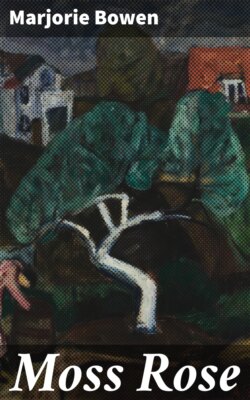Читать книгу Moss Rose - Bowen Marjorie - Страница 16
На сайте Литреса книга снята с продажи.
* * *
ОглавлениеTable of Contents
Now it was all over. Daisy Arrow had been taken to the mortuary, the doctor had come and gone; the back room where Belle had heard that man's pleasant voice which had been silenced by her exasperated knocking, had been sealed up and put in charge of the police.
That, as Belle had foreknown, was a mere formula, because the whole apartment had already been carefully searched and had revealed nothing extraordinary, except the large stained clasp-knife with which the crime had been committed—the overbrimming basin in which the murderer had washed his hands, and the torn towel on which he had wiped them. For the rest, nothing but trivial commonplace things—some of Daisy Arrow's finery on a hook—some of Daisy Arrow's finery in the drawer—cheap furniture, already well-worn and marked before ever Daisy Arrow had taken up her residence in the room—several flat, empty glass flasks—pots of caking cold cream and drying rouge. On the washstand, a half-peeled orange; on the chairs and the bed, one or two cracked nutshells, an empty stained glass, an empty brandy flask on the chest of drawers.
Belle had found an intellectual interest in watching the police methods. She had had to go down into the kitchen with the other women.
The first questioning was brief; there was so little that anyone could say, so very little that anyone knew.
The last actions of Daisy Arrow's life had been so ordinary. She had visited the Cambridge and had borrowed the pink plumes; she had attempted to persuade Belle to accompany her to the Argyll Rooms or the Alhambra. Nothing odd in this or in her return to No. 12 late at night, slightly drunk; with a bag of fruit, her paying of ten shillings off her rent, her tale of the gentleman whom she had met and whom she had brought home with her; there was nothing in this the least peculiar or suspicious. No one—and this was very vexatious to the police—had seen the stranger. They had heard his step, his voice, but that was all.
Daisy Arrow had said he was a foreigner. There Was nothing even peculiar about that. Several foreigners had been at No 12 before. Mrs. Bulke had even had a foreign lodger—a French gentleman she thought he was—for a considerable time.
Even the sharp and practised questioning of Superintendent Matchwell of Division E, who, by the afternoon, had been sent round to take charge of the enquiry, could not elicit from any of the inhabitants of No. 12—even including poor Moll, who had been brought round from her refuge at the chandler's shop—anything that might throw the least light on the end of Daisy Arrow.
The only two out-of-the-way circumstances that the long cross-examination of these women produced, were these: the fact of Daisy Arrow's air of excitement and triumph, for she was usually, it seemed—even when she had been drinking—melancholy and reserved, rather dull in her manner, and the fact that she had come down for the third time into the kitchen, asking for two most unusual forms of refreshment—champagne and fine old brandy. "Which had never been asked for in this house before, I suppose, ma'am," remarked Superintendent Matchwell.
He was a refined-looking man with a shrewd pock-marked face and sandy whiskers. Though he conducted the enquiry quietly and gave the least possible trouble and offence, Mrs. Bulke disliked him intensely. She had always detested the new detective police. She had known her way about with the old Bow Street constables, but this new force was composed of a different class of man, from whom the landlady of No. 12 had a distinct aversion.
"And why, ma'am," asked Superintendent Matchwell, with his trained glance keenly and unobtrusively on the florid face of the landlady, "should the young woman have asked for champagne and brandy?"
"How should I know? I told her it was a gentleman's drink, but she said she wanted it for a gentleman, and I think he was, too, from what I could hear of his voice."
The detective made a note of that—a foreigner and a gentleman.
"That would be," he suggested, tentatively, tapping his feet and his pencil, "that would be a bit unusual here, wouldn't it, ma'am—a gentleman?"
Mrs. Bulke, with the air of one who disdained subterfuge, admitted "that it would be unusual."
